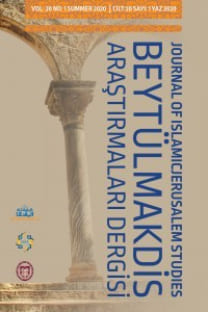Osmanlı Son Döneminden İsrail’in İşgaline Kadar Kudüs Kafeleri ve Ulusal Rolü
Kudüs, Osmanlı, Kahvehane, Kahvehaneler, Beytülmakdis, İngiliz İşgali, Siyonist İşgal
Al-Quds Cafés and their National Role from the end of the Ottoman Era until the Israeli Occupation
Coffeehouses, Bayt al-Maqdis, Jerusalem, Ottoman, British Occupation, Zionist Occupation,
___
- Ahmad, U. (2008) Mujam al-Lugha al-Arabiyah al-Mu’asirah. Cairo: Alam al-Kitab.
- Al-Arif, A. (1986) al-Mufasal fi Tarikh al-Quds. Jerusalem: Matbat al-Marif.
- Al-Jindi, A. (2010) Maqahi al-Quds al-Qadima.. Halaqat Ijtimaiyah wa-Thaqafiyah wa-Watantiyah Indatharat wa-‘Ashat Hikayatha. Al-Jazeera Net, 21 October, 2020 ; aja.me/x7fej
- Al-Madani, Z. (2004) Madinat al-Quds wa-Jiwarha fi Awakhir al-Ahd al-Uthmani. Amman: Manshurat Bank al-Amal.
- Al-Sakakini, H. (2019) Ana wal-Quds Sirah Zatiyah. Beirut: Mu’asasat al-Dirasat al-Filistiniyah.
- Al-Sakakini, K. (2004) Yawmiyat al-Sakakini. Ramallah: Markaz Khalil al-Sakakini.
- Barakat, B. (2012) Magahi al-Quds fi al-Ahd al-Uthmani, Hawliyat al-Quds, vol.13.
- Dawlah, Z. (2020) Magahi al-Quds al-Qadimah.. Hikayat ala Karasi al-Qash. Al-Imarat al-Yawm Newspaper, 16 November 2020. www.emaratalyoum.com/life/four-sides/2020-11-16-1.1422252
- Encyclopedia Palestina (1984) Damascus: Hay’at al-Mawsuah al-Filistiniyah. 1st Edition.
- Ghoshe, S. (2010) al-Hayat al-Ijtimayiyah fi al-Quds fi al-Qarn al-Ishrin. Beirut: al-Mu’asasah al-Arabiyah lil-Dirasat wal-Nashir.
- Hattox, Ralph (1985) Coffee and Coffeehouses: The Origins of a Social-Beverage in the Medieval Near East. London: University of Washington Press.
- Izhiman, S. (2019) Magha Siyam fi al-Baldah al-Qadimah munz al-Ahd al-Uthmani, Hikayat Maqdisiyah, Ihna TV, 29 July 2019.
- Salih, M. et.al (2010) Ana Ya Dunya. Bierut: Markaz al-Zaytouna lil-Dirasat wal-Istisharat.
- Scholch, Alexander (1988) Tahawulat Jazriyah fi Filistin 1856-1882. Amman: Jordan University.
- Tamari, S. (2004) Magha al-Sa‘alik wa-Imarat al-Batalah al-Maqdisiyah, al-Dirasah al-Filistiniah, Winter 2004, vol.57.
- Tamari, S. and Nassar, I. (2003) al-Quds al-Uthmaniyah fi al-Muzakirat al-Jawhariyah (1904-1917). Jerusalem: Mu’assat al-Dirasat al-Maqdisi.
- Tamari, Salim (2000) Jerusalem’s Ottoman Modernity: The Times and Lives of Wasif Jawhariyyeh, Jerusalem Quarterly File, no. 9.
- ISSN: 1367-1936
- Yayın Aralığı: Yılda 2 Sayı
- Başlangıç: 1997
- Yayıncı: Beytülmakdis Çalışmaları Vakfı
KUDÜS’ÜN KAYBI MÜSLÜMANLARIN HATASI MI? YOKSA HAÇLILARIN BAŞARISI MI?
Osmanlı Son Döneminden İsrail’in İşgaline Kadar Kudüs Kafeleri ve Ulusal Rolü
MEDRESELERİN DOĞUŞU VE KUDÜS’TEN YEDİ ASIRLIK BİR ÖRNEK: SALÂHİYYE MEDRESESİ
Selahaddin'in Beytülmakdis'i teslim alma yolu -Sulh (antlaşma) ya da zorlama- ve bunun etkileri
ŞİÎ FÂTIMÎLERİN KUDÜS'Ü HAÇLILARDAN GERİ ALMA GİRİŞİMLERİ
III. HAÇLI SEFERİNİN “KUDÜS’Ü KURTARMA” SÖYLEMİ VE ETRAFINDA ŞEKİLLENEN ALGI
Selahaddin'in Beytülmakdis'i teslim alma yolu -Sulh (antlaşma) ya da zorlama- ve bunun etkileri
